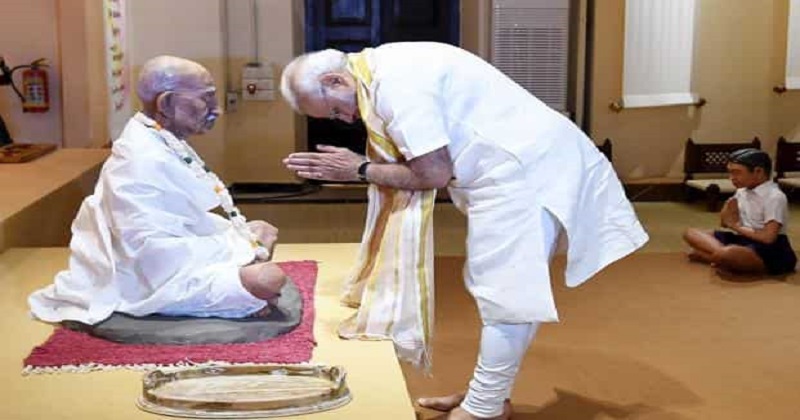
Prime Minister Narendra Modi, like he does each year, paid a heartfelt tribute to Bapuji at Rajghat in New Delhi as India commemorates the 153rd anniversary of Mahatama Gandhi’s birth. Since becoming India’s prime minister, Narendra Modi has consistently pushed people to follow in the footsteps of the ‘Father of the Nation’ and lead sustainable, healthy lives. Modi has consistently used the ‘Gandhian ideology’ and his independence battles to inspire and empower millions of people, whether on a national or international stage.
However, if we look back in time, PM Modi and Mahatma Gandhi have a long history of friendship. Here are three examples from Modi’s past that describe his affiliations: a letter, a photo, and a video that narrates his association with Mahatama Gandhi in his life journey.
1. A message written by PM Modi in the 1980s;
The prime minister’s personal journal from the 1980s contains a handwritten entry from the young man in which he quotes Mahatma Gandhi: ‘The only real, dignified, human doctrine is the greatest good of all, and this can only be realised by utmost self-sacrifice’. The Gandhian concept of ‘Sabka Saath, Sabka Vishwas, Sabka Vikas, and Sabka Prayas,’ which emphasises rising above ‘all politics,’ is also a product of the Modi regime.
"The only real, dignified, human doctrine is the greatest good of all"
A quote by #MahatmaGandhi penned by a young Modi, the public welfare schemes of whom continue to echo the Mahatma's idea – Sabka Saath, Sabka Vikas.
[Handwritten, Personal Diary, Quote from Mahatma Gandhi] pic.twitter.com/kiQyWzt1Jy— Modi Archive (@modiarchive) October 2, 2022
PM Modi wrote, ‘I do not subscribe to the maxim of the greatest benefit for the greatest number. To obtain the alleged good of 51%, one must forsake the good of 49%. It is a callous doctrine that has harmed humanity. The greatest good of all is the one true, honourable doctrine ‘.
2. Seeking Gandhi’s blessings just a few days before swearing in as Gujarat CM;
In 2001, a photo of PM Modi worshipping Bapu’s image and pleading for his blessings was shot. In 2001, on the occasion of Gandhi Jayanti, Modi travelled to Porbandar, the city where Bapu was born, to ask for his approval. He was photographed admiring the portrait of the nation’s greatest liberation fighter. Narendra Modi took office as Gujarat’s chief minister for the first time just a week later, on October 7, 2001. He has held that position for the past 21 years.
At Porbandar, the place where #MahatmaGandhi was born, Modi looks at a portrait of the Mahatma.
After a few days, Modi was sworn in as Gujarat's Chief Minister and has been in public office for 21 years since.
[Porbandar, #GandhiJayanti, October 2, 2001] pic.twitter.com/ViItBAYhV0— Modi Archive (@modiarchive) October 2, 2022
3. Modi’s ‘Jan Bhagidari’ address dated 15 years ago;
Gandhi’s notion of ‘Jan Bhagidari,’ or ‘people’s participation,’ was espoused by Modi, who was the then-chief minister of Gujarat, in 2007. Modi called for a similar campaign for India’s ‘development’ by citing how Mahatama Gandhi brought people together in their desire for the nation’s freedom battle after ‘Jan Bhagidari’.
On #GandhiJayanti, here's the video that defined Modi's public policy journey – the philosophy of Jan Bhagidari.#MahatmaGandhi united people in their desire for freedom, through Jan Bhagidari. Modi calls for a similar movement for development.
[Hindustan Times conclave, 2007} pic.twitter.com/qlSf091643— Modi Archive (@modiarchive) October 2, 2022
He remarked in his speech, ‘In terms of growth, I believe that everyone in the nation shared a yearning for freedom at the time of independence, which led to a sense of unity among all citizens. Since 1857, there has been talk of a freedom movement, and many individuals have worked very hard and made sacrifices for the cause. There were hundreds of persons who were imprisoned in Andaman and Nicobar, but Mahatma Gandhi’s greatest contribution was that he made the fight for freedom into a widespread movement ‘.
‘Everyone in the population believed they could help in the country’s liberation effort. Each and every person who was a part of this movement and was inspired by Gandhiji felt a sense of pride for their nation. If we could have engendered that yearning for progress with the spirit of freedom that Gandhiji inspired, that would have been good. The change would have in fact resulted in a widespread movement ‘.

Post Your Comments